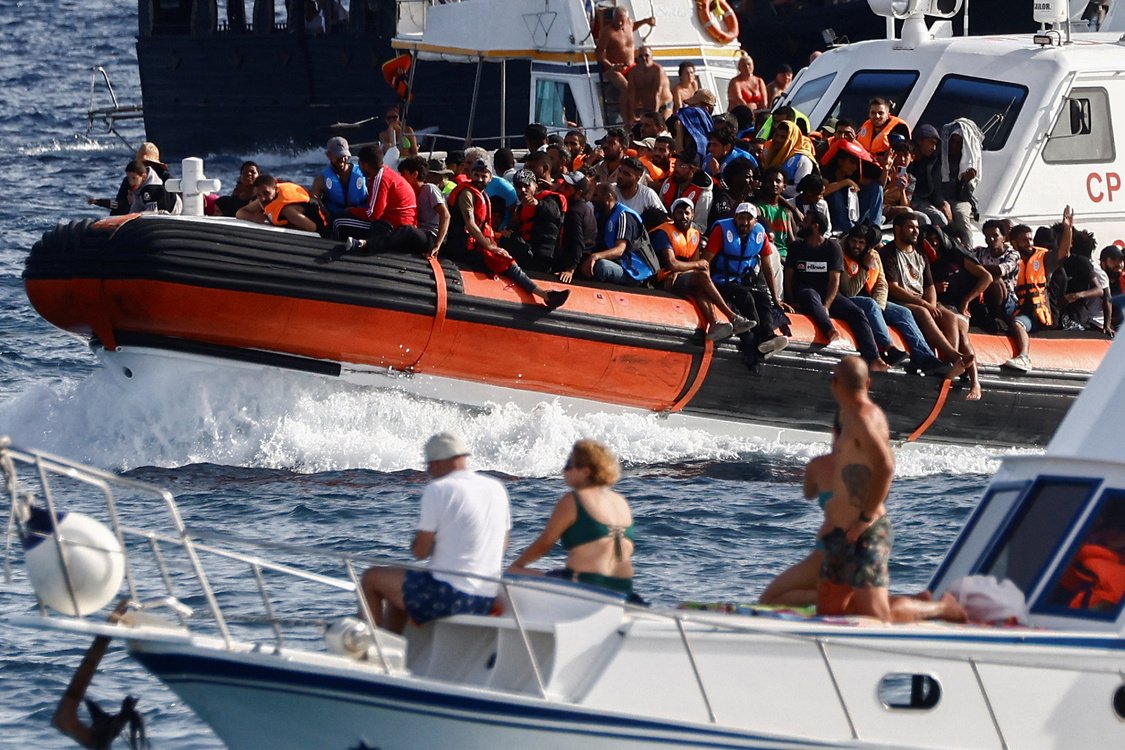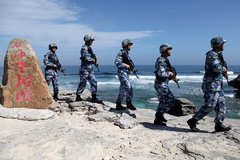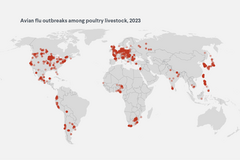- RealEcon
- Israel-Hamas
- Topics
FeaturedInternational efforts, such as the Paris Agreement, aim to reduce greenhouse gas emissions. But experts say countries aren’t doing enough to limit dangerous global warming.
- Regions
FeaturedThe 2021 coup returned Myanmar to military rule and shattered hopes for democratic progress in a Southeast Asian country beset by decades of conflict and repressive regimes.
Backgrounder by Lindsay Maizland January 31, 2022
- Explainers
FeaturedDuring the 2020 presidential campaign, Joe Biden promised that his administration would make a “historic effort” to reduce long-running racial inequities in health. Tobacco use—the leading cause of p…
Interactive by Olivia Angelino, Thomas J. Bollyky, Elle Ruggiero and Isabella Turilli February 1, 2023 Global Health Program
- Research & Analysis
FeaturedLost Decade is an essential guide for understanding the historic shift to Asia-centric geopolitics and its implications for the United States’ present and future. Across the political spectrum, …
Book by Robert D. Blackwill and Richard Fontaine June 11, 2024 Asia Program
- Communities
Featured
Webinar with Carolyn Kissane and Irina A. Faskianos April 12, 2023
- Events
FeaturedJohn Kerry discusses his work as U.S. special presidential envoy for climate, the challenges the United States faces, and the Biden administration’s priorities as it continues to address climate chan…
Virtual Event with John F. Kerry and Michael Froman March 1, 2024
- Related Sites
- More
Sean Gallup/Getty Images
NATO (North Atlantic Treaty Organization)
The war in Ukraine marks a new era of instability in Europe. Countering Russia’s efforts will require a stronger, more coordinated NATO.
Russia’s early setbacks in its invasion of Ukraine could have foreclosed on some of President Vladimir Putin’s sweeping war objectives, but he is unlikely to relent given the conflict’s momentum.
Nine charts illustrate the extraordinary level of support the United States has provided Ukraine in its war against Russian invaders.
U.S. Foreign Policy
After the rise of Chinese power during the 2010s, the United States should place Asia at the center of its grand strategy.
Robert D. Blackwill and Richard Fontaine evaluate the limitations of the Pivot to Asia and offer a compelling vision for the future of U.S. foreign policy in the Indo-Pacific.
The United States and China have one of the world’s most important and complex bilateral relationships. Since 1949, the countries have experienced periods of both tension and cooperation over issues including trade, climate change, and Taiwan.
European Union
Far-right advances in the European Parliament elections have destabilized politics in France, a longstanding pillar of the European Union, and highlighted fault lines in the bloc.
Liana Fix, a fellow for Europe at the CFR, and Matthias Matthijs, senior fellow for Europe at CFR and associate professor of international political economy at Johns Hopkins University's School of Advanced International Studies, sit down with James M. Lindsay to discuss the results and consequences of the 2024 European Parliament elections.
G7
Outright seizure of the Russian Central Bank’s hundreds of billions in frozen assets is currently off the table, but it is still possible to obtain large sums for Ukraine from the interest income on these assets.
Diplomacy and International Institutions
The Group of Seven (G7) has been a forum to coordinate global policy for fifty years, but experts are increasingly questioning the group’s relevance.
Russia has caused unprecedented damage in Ukraine. And with no diplomatic end in sight to the conflict, many Ukrainians are wondering when, if ever, they will be able to go back to their homes. According to many experts, the answer is actually sooner rather than later. Can reconstruction begin before a war ends? Who pays, and where should world leaders begin?
Europe
Each Friday, I look at what the presidential contenders are saying about foreign policy. This Week: President Joe Biden spoke with Time magazine about the importance of alliances to U.S. security.
CFR experts discuss President Joe Biden's first state visit to France, U.S.-Europe relations, and the future of support to Ukraine.
Middle East
Steven A. Cook, the Eni Enrico Mattei Senior Fellow for Middle East and Africa Studies at CFR, sits down with James M. Lindsay to discuss the United States’ past, present, and future policy in the Middle East.
Already hobbled by economic struggles, Lebanon now faces the prospect of war as the militant group and political party Hezbollah clashes with Israel in apparent support of Palestinians in the Gaza Strip.
A clear-headed vision for the United States' role in the Middle East that highlights the changing nature of U.S. national interests and the challenges of grand strategizing at a time of profound change in the international order.
Events
In The End of Ambition, Steven A. Cook boldly claims that despite setbacks and moral costs, the United States has had a record of success in the Middle East. Yet, beginning in the 1990s, those achievements bred ambitious policies to remake the region that ended in failure and regional instability. While making the case that retrenchment is not the answer to America’s problems in the Middle East, Cook highlights how America’s interests in the region have begun to change and examines alternative approaches to U.S.-Middle East policy. The John B. Hurford Memorial Lecture was inaugurated in 2002 in memory of CFR member John B. Hurford, and features individuals who represent critical new thinking in international affairs and foreign policy. For those attending virtually, log-in information and instructions on how to participate during the question and answer portion will be provided the evening before the event to those who register. Please note the audio, video, and transcript of this hybrid meeting will be posted on the CFR website.
Cindy McCain shares her vision to combat hunger and malnutrition around the world. The World Food Programme (WFP) works in the most challenging contexts around the world, reaching more than 150 million people a year. As food becomes an increasingly important issue for stability and peace, she will discuss how WFP navigates crises and works to put in place a more stable and resilient future for the most vulnerable communities. The Sorensen Distinguished Lecture on the United Nations was established in 1996 by Gillian and Theodore C. Sorensen to highlight the United Nations and offer a special occasion for its most distinguished and experienced leaders to speak to the Council membership.
David E. Sanger discusses U.S. rivalry with the other two great nuclear powers—Xi Jinping’s China and Vladimir Putin’s Russia—the choices that lie ahead, and what is at stake for the United States and the world. This special event is being held to honor the memory of Leslie H. Gelb, CFR’s president from 1993 to 2003 and a dedicated member for forty-six years. Gelb modernized the institution to reflect the changing realities of the post-Cold War era, and was a passionate advocate of common sense and strategy in U.S. foreign policy. For those attending virtually, log-in information and instructions on how to participate during the question and answer portion will be provided the evening before the event to those who register. Please note the audio, video, and transcript of this meeting will be posted on the CFR website.
Stephen Schneck and Eric Ueland, commissioners of the United States Commission on International Religious Freedom (USCIRF), will join Elizabeth Cassidy, senior strategic advisor of USCIRF, to present the key policy recommendations of the USCIRF 2024 annual report and the foreign policy implications of international religious freedom today. USCIRF is an independent, bipartisan U.S. federal government agency created by the 1998 International Religious Freedom Act that monitors the universal right to freedom of religion or belief abroad; makes policy recommendations to the president, secretary of state, and Congress; and tracks the implementation of these recommendations. USCIRF’s nine Commissioners are appointed by either the president or congressional leaders of each political party, and are supported by a non-partisan professional staff.
Explainers
Europe’s Migration Dilemma
Hundreds of thousands of migrants made the dangerous journey to Europe in 2023, fleeing war, poverty, and natural disasters. The increase in arrivals has fueled support for far-right political parties.
Expert Spotlight
Featured Publications
Robert D. Blackwill and Richard Fontaine evaluate the limitations of the Pivot to Asia and offer a compelling vision for the future of U.S. foreign policy in the Indo-Pacific.
A clear-headed vision for the United States' role in the Middle East that highlights the changing nature of U.S. national interests and the challenges of grand strategizing at a time of profound change in the international order.
Paul J. Angelo provides the first headlining case studies of Plan Colombia and the Mérida Initiative.
 Online Store
Online Store 











